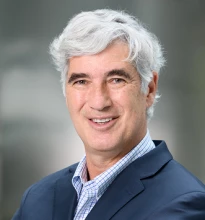 Health care systems are not optimized to treat older people’s unique health needs, but countries can turn the aging-population challenge into an opportunity to build healthier and more productive and inclusive societies. Copyright: Allison Kwesell/World Bank
Health care systems are not optimized to treat older people’s unique health needs, but countries can turn the aging-population challenge into an opportunity to build healthier and more productive and inclusive societies. Copyright: Allison Kwesell/World Bank
The evidence is all around us—in the faces of parents living into their 90s, in older coworkers adding value to their workplaces, and in care facilities overflowing with this rapidly aging population.
People aged 65 and older now outnumber children under age 5 worldwide. By 2050, 1.5 billion people will be 65 and older. As populations age, chronic diseases will skyrocket. In low- and middle-income countries (LMICs), 75 percent of deaths from noncommunicable diseases (NCDs) occur among adults over 60.
Health care systems need to address older people’s unique needs
Seniors have much to contribute to families and society, but they need support to remain healthy and vibrant. Unfortunately, health care systems are not optimized to treat older people’s unique health needs. Seniors face multiple barriers to care including high cost, lack of access to medicines and transportation to clinics, enough trained providers to care for them, and age discrimination.
The new World Bank publication, “Silver Opportunity: building integrated services for older adults around primary health care,” argues that governments have an opportunity to ameliorate these conditions by reimagining primary health care (PHC) for older people and integrating it with other forms of person-centered care, including community care, secondary and tertiary care, and long-term care. PHC systems can be adapted to meet seniors’ diverse needs, improve health outcomes, and control costs.
If governments succeed, they will dramatically improve people’s health, strengthen social inclusion, and speed progress toward development and health goals, including universal health coverage.
Japan is a leader in caring for seniors
With one of the highest proportions of elderly people in the world, Japan is strengthening elder care. In 2000, the country implemented public long-term care insurance (LTCI), which includes preventive care, home visits, day services, short-stay services, residential services, and long-term care. LTCI recognizes long-term care as a societal issue and provides affordable care financed by taxes and insurance premiums.
Japan’s municipalities also have a community-based integrated care system, which aims to keep people with illnesses and disabilities living in their communities. It ensures that communities, rather than institutions, provide housing and support for daily living.
How can governments begin improving health care for older adults?
To be responsive to their aging populations, governments and health systems must first understand older people’s needs and care preferences. In a rapidly changing world, seniors’ health requirements, expectations, and proclivities are also evolving. Consultative processes that ensure a strong voice for older people in decision-making, engage seniors as actors in their own care, and understand care preferences across variables such as age, socioeconomic status, and gender are critical for realizing the aspiration for a high quality of life for older adults. Coordination with other sectors, such as social protection and labor, infrastructure, transportation and urban planning, as well as with the private sector will be key for success.
The World Bank has a new framework for senior care
“Silver Opportunity” presents an original framework to show how key policy levers—health financing, innovation in service delivery and digital technology, regulations, and evaluation, which we call the FIRE framework —can create PHC systems that respond more sensitively and comprehensively to the needs of older people, coordinate care across different medical and social support systems, and improve older people’s health:
- Financing is a major tool to shape the accessibility, quality, and efficiency of health care services and incentivize care integration.
- Fostering innovation is vital to addressing the evolving needs of an aging population. Innovative service delivery models emerging in both high-income countries and some low-and middle-income countries promote person-centered integrated care tailored to older adults.
- Governments are responsible for the regulation of care systems for older adults, which should be shaped by core values such as maintaining elders’ dignity and autonomy, meeting their diverse needs, and facilitating integration among stakeholders.
- Evaluation and measurement are key to understanding older people’s needs and ensuring that the supply of services matches demand. Many low and middle-income countries face deficits in research, validated tools, and empirical evidence. Countries need reliable estimates of the number of older people with disabilities or illnesses that prevent them from living independently.
By utilizing the FIRE levers, along with other entry points for PHC reform, countries can turn the aging-population challenge into an opportunity to drive long-awaited system transformation and build healthier and more productive and inclusive societies.
The book, “Silver Opportunity: building integrated services for older adults around primary health care,” edited by Xiaohui Hou, Jigyasa Sharma and Feng Zhao, will be launched publicly in an event on February 27th, 2023 in Tokyo, Japan with interventions from representatives of Japan’s Ministry of Finance, Ministry of Health, Labour and Welfare, Japan International Cooperation Agency (JICA), Kyoto University and Mitsubishi Research Institute. This work is supported by the Government of Japan through the Universal Health Coverage Window of the Japan Policy and Human Resources Development trust fund.


Join the Conversation